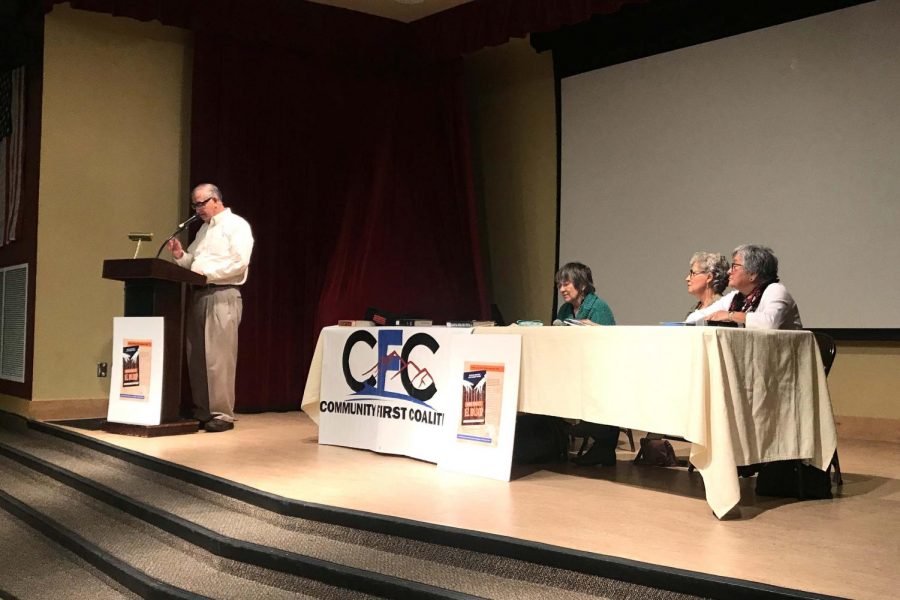The El Paso Community First Coalition, a network of community advocates, hosted a presentation and discussion on the newly released book “Who Rules El Paso?” covering controversial community issues within the City of El Paso, Dec. 15 at the downtown El Paso Library.
The book’s main authors, Carmen E. Rodríguez, Kathleen Staudt, Oscar J. Martínez and Rosemary Neill, each spearheaded different parts of the book with the help of several other contributors.
“We saw a need for the public to have more information about local governance, how our tax money is being spent, how decisions are being made, who influences those decisions the most and how the community interest is considered by those people in power in this city,” said Martínez, a scholar and borderlands history expert.
After Martínez welcomed the crowd and congratulated the contributors of the book, Rodríguez took to the microphone to address the city’s low voter turnout rate of 4.49% in the previous day’s election and to discuss the book’s first chapter, “The Fight for Duranguito–and Against Taxpayer Abuse & Deception.”
“I think that a lot of you already know much of what is in the book, but I think that we have a very serious problem in the community,” said Rodríguez, a local attorney and wife of retiring Texas Senator Jose Rodríguez. “Yesterday’s election is an indication that people aren’t engaged, that people aren’t interested, and we ask ourselves ‘Why?’ all the time. People just don’t vote.”
After her solemn reflection on El Paso’s voter apathy, Rodríguez told the tale of Bill Sanders, an El Paso native who went to Chicago and made a fortune in the real estate business.
According to Rodríguez, Sanders returned as a wealthy man looking to revitalize Downtown El Paso with the help of lucrative businessmen like Paul L. Foster and Woody L. Hunt, envisioning the swath between San Jacinto Plaza and the U.S.-Mexico border as a top-notch entertainment zone.
In that pursuit, Rodríguez said that the business tycoons pulled the strings in the city’s 2012 bond election to subsidize the bond’s signature sports stadium with taxpayer monies, vaguely worded as a “multi-purpose facility” which, according to Rodríguez, deceived voters.
Executing the projects meant clearing areas in Downtown El Paso for redevelopment which encompasses “barrios” or low-income neighborhoods.
The attorney illustrated the upheaval of activists to protect the Duranguito barrio, which included protests in 2017 and an ongoing legal battle to block the demolition of the barrio spearheaded by UTEP professor Max Grossman. The fight has since reached the Texas Supreme Court after several appeals.
After an alarm marked the end of Rodríguez’s presentation, Staudt walked over to the podium.
“I am looking at political contributions and asking the provocative question, ‘Are these the best candidates that money can buy?’ I want to know using evidence from official campaign materials that are filed for the public to see,” said Staudt, a former political science professor at UTEP and lauded academic. “I want to ask who invests in these candidates and why. Do we live in a pay to play city government?”
Staudt’s presentation included an analysis of campaign finance reports on the current members of the city council like El Paso Mayor Dee Margo who was elected in 2017.
“Margo raised $378,000. He had many, many donors, but I was interested in who are the top 10 donors and who are the top 20 donors. Now the top 10 donors make up a quarter of this total,” said Staudt. “Some donors went as high as $23,500 in cash. Anybody in this room able to contribute 20 something thousand dollars for campaigns? $10,000? $5,000?”
Staudt also examined the finance reports of the eight city council members, revealing the highest and lowest dependency rates on donors that give more than $1,000 by district.
“The dependency rates range from 73% in district six to 33% in district two, the lowest dependency rate. Big donors can propel relatively unknown people onto our city council.”
Staudt also highlighted that Austin, Texas has a $400 cap on individual campaign contributions, a rule unlikely to become a reality in El Paso, according to her.
Following Staudt’s discourse, Neill addressed the conspicuous flaws of the city’s fiscal management of taxpayer dollars.
“We believe it is important to understand how existing economic policies impact city investments. Our chapter in ‘Who rules El Paso?’ explores three areas of fiscal management, our municipal debt, the imbalance in our tax base and the success of city’s economic development strategies in creating good paying jobs.”
Neill mentioned the city’s $2.2 billion debt as of Aug. 31, 2018 that keeps increasing, placing a burden on tax-paying residents. She also highlighted city council’s past use of certificates of obligation bonds totaling $100 million and that they do not require voter approval. Neill asserted that the city government should be more selective in what it decides to finance or subsidize and “ensure that each project has a discernible public good in the form of stable jobs and community investments.”
Martínez then took the podium to discuss several topics he authored in the book, but one topic he especially delved into was the controversial selection of Heather Wilson as the successor of UTEP President Emerita Diana Natalicio.
“Heather Wilson has a very interesting background, right? Trump appointee, coming here she was Secretary of the Air Force. Then she (led) a small university in South Dakota, a very small university with a very different cultural environment. She had a checkered record in Congress, one watchdog group labeled her as one of the most corrupt people in Congress. They had a list of 22. She was among the 22,” Martínez said with a noticeable passion in his voice. “How does she manage to come here? Well, the oligarchs brought her here, Paul Foster, Woody Hunt.”
Martínez emphasized the community’s initial reception of her selection and how the regents of the University of Texas System “conducted the search in a secretive manner.”
After a dense conversation grazing over most of the in-depth topics depicted in the book, members of the community had the chance to pose questions to the panel. The Prospector inquired on how the city council can fund projects without substantial taxpayer subsidies to which Rodríguez responded.
“I had that question myself when I was trying to learn as much as I could,” she said. “I would say that the primary model for these kinds of venues, sports arenas and things like that is a public–private participation effort. I think that’s where we fall apart in terms of the kinds of financing available. We just don’t cut good deals. We give away the farm and call it public–private, when it’s mostly public.”
Bryan Mena may be reached at [email protected]












